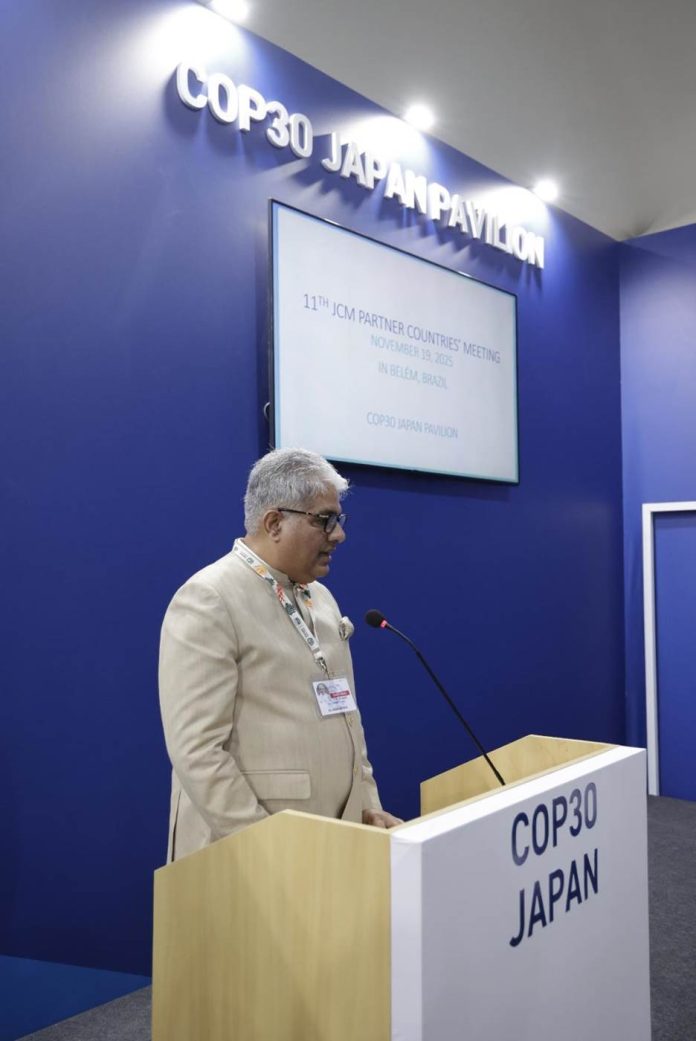Union Minister for Environment, Forest and Climate Change, Shri Bhupender Yadav, participated in the 11th Joint Crediting Mechanism (JCM) Partner Countries’ Meeting, organized by Japan’s Ministry of the Environment, on 19 November 2025. The meeting was held on the sidelines of the UNFCCC CoP30 in Belém, Brazil.
The session was chaired by H.E. Mr. Hirotaka Ishihara, Minister of the Environment, Japan, and brought together ministers and representatives from JCM partner countries to review progress and reaffirm their commitment to strengthening bilateral climate cooperation.
In his opening address, H.E. Mr. Ishihara announced that the JCM has expanded to include 31 partner countries, with over 280 projects being implemented under Article 6 of the Paris Agreement. He highlighted plans to extend the collaboration globally by creating frameworks for long-term investments, facilitating participation of partner nations in climate resilience projects, and supporting capacity-building programs.
Addressing the gathering, Shri Yadav underscored the importance of cooperative mechanisms at a time when the world seeks scalable, equitable, and technology-driven climate solutions. He described initiatives like the JCM as “a significant approach in strengthening efforts for climate action while supporting national priorities, particularly for developing countries.” He also noted that India and Japan share a “long-standing partnership rooted in trust, technology cooperation, and shared commitment to sustainable development.”
Referring to the India–Japan Memorandum of Cooperation signed on 7 August 2025, Yadav emphasized that the JCM aligns with Article 6 of the Paris Agreement and “provides a clear framework for both governments and the private sector to jointly develop mitigation projects, mobilize finance, deploy advanced technologies, and transparently allocate the resulting emission reductions.” He added that this mechanism exemplifies how bilateral cooperation can practically reinforce multilateral objectives in a mutually beneficial manner.
The Minister highlighted that the JCM would directly contribute to India’s Nationally Determined Contributions (NDCs) and Long-Term Low Emission Development Strategy. He noted that “low-carbon technologies approved by the National Designated Agency for Implementation of Article 6 will play an important role in catalyzing our long-term goals.”
Shri Yadav further outlined that the mechanism is expected to facilitate investment, technology deployment, and capacity-building support for advanced low-carbon technologies, helping develop a domestic ecosystem, localize high-technology interventions, and contribute to India’s sustainable development goals.
He also updated partners on the progress of implementation frameworks, stating that the Rules of Implementation and key activity-cycle documents are in advanced stages of finalization. The Bureau of Energy Efficiency in India is developing the Indian Carbon Market portal, which will include a dedicated module for the JCM and other cooperative approaches under Article 6, ensuring transparency, efficiency, and ease of project facilitation.
Looking ahead, Shri Yadav said JCM activities are expected to cover priority sectors including renewable energy with storage, sustainable aviation fuel, compressed biogas, green hydrogen and green ammonia, as well as best-available technologies in hard-to-abate sectors such as steel, cement, and chemicals. “These areas align with India’s development priorities and offer significant opportunities for collaboration,” he added.
Concluding his address, Shri Yadav reaffirmed India’s commitment to working closely with Japan and all JCM partner countries, stating, “Our cooperation with Japan demonstrates how high-integrity, cooperative mechanisms can support investment in appropriate technology deployment while strengthening the implementation of the Paris Agreement.” He called for collective action to ensure the JCM becomes “a model for transparent, impactful, and equitable climate partnerships.”














